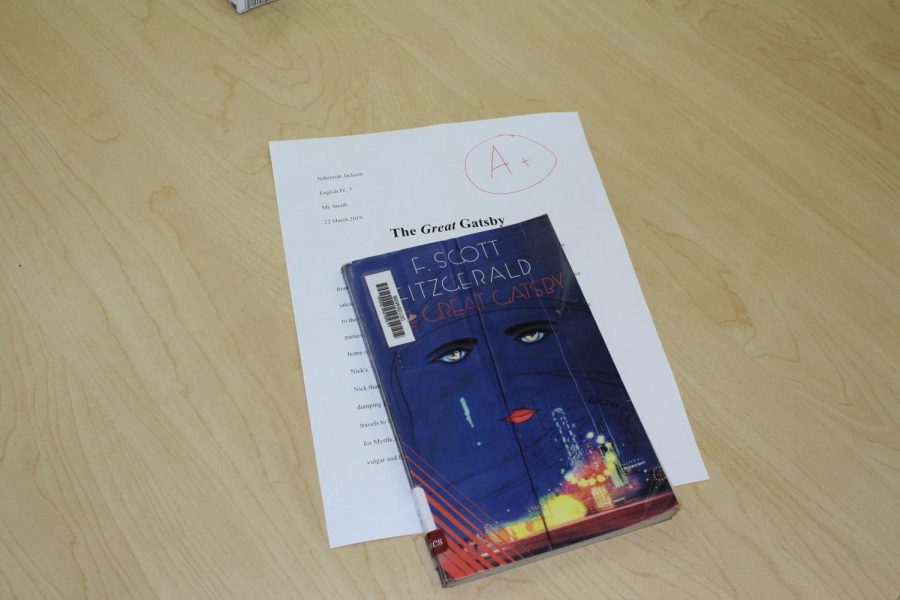Reading’s Worst Enemy: School
In school, teens are rewarded for reading, effectively destroying teens’ desire to read outside of school by associating it with work.
A typical “reading reward” for students.
October 11, 2018
Reading is almost a lost art among teenagers and adults alike around the world. A study done by Common Sense Media gives an eye-opening statistic that captures the dramatic decline in reading between the pre-adolescent and post-adolescent years. While approximately 53 percent of 9 year olds read for fun, only 19 percent of 17 year olds read for fun. This significant drop begs the question: why do kids stop reading? The answer is in one of the last places you would think: school.
John Fish, a Harvard student, discusses this issue in his video, “Reading A Book a Week is Changing My Life,” saying that “the problem with the way reading is approached in school is that it associates a reward with the act of reading.”
Fish provides a very concise view on the widespread problem that rarely receives any serious recognition. In the video, he expands on this topic. “If you read a book, you do well on a presentation or on your test or on your essay,” he says. “It turns it into a transaction, so now when you take away that reward, you are doing what feels like ‘work,’ because previously you exchanged it for a reward.”
However, the idea of school associating reading with a reward isn’t the only reason that school begins to destroy a kid’s desire to read for pleasure. The other is homework. According to the Los Angeles Times, the typical high schooler is assigned an average of 17 and a half hours of homework every week. This equates to about three and a half hours per day.
After spending around six and a half hours in school (extracurriculars could raise this time to a whopping nine hours), another three sounds terrible. The prospect of reading after those hours— which doesn’t seem to contain any obvious reward or derive any serious pleasure—sounds like torture to most teenagers.
When asked about the last time he read and completed a book, senior Luke Mariani scratched his chin, looked to the sky, and after a moment of pondering answered, “Sixth grade.” The tone of his voice was more of a question than an answer. David Le, also a senior, answered with a look similar to Luke’s: “I genuinely can’t remember the last book I read.” After a moment he added, ““The Blood Of Olympus,” I think.” These teens are perfect examples of the distaste towards reading many students share due to school.
School isn’t the only reason for the teenager’s lack of a desire to read, but it is a much bigger part of the problem than some people realize. The other main factor that has led to a decline in reading is technology. For instance, here’s a question that is posed to most teens around the globe on a daily basis: why read when your phone is an inch away?
Reading keeps the brain active, allowing you to improve not only your memory, but also your intellect. In addition, as you read, your focus and concentration improve. If you aren’t interested in improving your intellect, then reading also allows you to escape this world for a brief period, and enter worlds where anything is possible. A good piece of fiction allows you to lose yourself in the story, forgetting all of the relentless, arbitrary thoughts that plague your mind; this can reduce stress greatly.
When asked about the benefits of reading in day to day life, Mr. Larson, a passionate English teacher of both freshmen and seniors, said that “reading allows you to better understand the world within you and to better situate yourself in the world that surrounds you.”
Typically, when people think of reading, the stereotypical image that comes to mind is one of a dusty classic that stretches far beyond a thousand pages. This is a daunting prospect and probably isn’t the best place to start. However, rekindling your desire to read requires finding your preferred genre, so my advice is to experiment with different genres and find what you want to read.
Technology, which usually has negative connotations when associated with reading, can actually be a helpful tool. For instance, the app Libby allows you to check out any book from the library, provided that you have a library card. The process is simple, and you can always use the app, Strides, to set a habit.
In the midst of high school craziness, reading tends to be forgotten. This, to some extent, can be attributed to the way school is structured, but the decline in teens’ desires to read shouldn’t only be blamed on school. Advancements to technology also contribute significantly to this decline. However, considering the vast range of benefits from reading, it’s important that reading isn’t forgotten.






Ms. Stroud • Oct 25, 2018 at 11:45 am
What a great article! Thank you for your insight and information. I truly enjoyed reading this!
Tina Childress • Oct 19, 2018 at 5:50 pm
Great article with some good insight. Thanks.
Krista Stockett • Oct 18, 2018 at 7:46 pm
Great article! Very impressive. I always tell students if you want to visit different time periods or cultures, read a book!
Mr. De Ieso • Oct 18, 2018 at 1:47 pm
Boom! This article should be required reading for teachers and all parents.
My favorite quote
“A good piece of fiction allows you to lose yourself in the story, forgetting all of the relentless, arbitrary thoughts that plague your mind; this can reduce stress greatly.”
I will file this away to read again and again.
Nice work Nehemiah.
Braeden • Oct 14, 2018 at 1:24 am
This was a great article, very well written and informative. This may have just inspired me to read…
Evan Lee • Oct 13, 2018 at 9:17 pm
I agree with this article. I used to read books in elementary school like Percy Jackson and couldn’t wait for the next one, but now I just don’t have the time and desire to read.
David Le • Oct 11, 2018 at 8:38 pm
Another great article Nehemiah! Can’t wait for more!